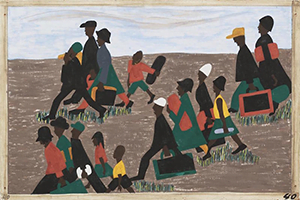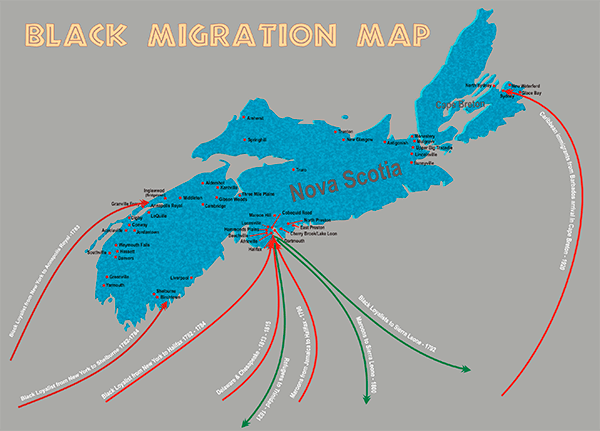A Brief History of Migration
 Many Atlantic Canadians remain unaware of the buying and selling of human property that took place on these shores during the heyday of slavery. Yet the slave trade was alive and well here, until the early years of the 19th Century.
Many Atlantic Canadians remain unaware of the buying and selling of human property that took place on these shores during the heyday of slavery. Yet the slave trade was alive and well here, until the early years of the 19th Century.
However, the vast majority of Nova Scotians of African descent arrived in the Maritime Provinces as free men and women, the result of three major migrations of Black people to the area.
The first group were the Black Loyalists, who came during and after the American War of Independence, settling mainly in New Brunswick and along Nova Scotia’s southern shore. (Many came as slaves, also, accompanying their American Loyalist masters.)
In 1792 a large number of this group emigrated to Sierra Leone, hoping for a better life in their ancestral homeland of Africa. Harsh weather conditions, persecution, unfulfilled promises – all contributed to the decision to leave.
The Black Loyalists were followed shortly before the turn of the century by the rebellious Jamaican Maroons, captured during an insurrection against their British masters, and deported far away from Jamaica to the northern colonies. (Later, the Maroons were responsible for constructing major renovations to Halifax’s Citadel Hill fortress.)
The third migratory group were the Refugee Blacks, who came in large numbers to take up residence in New Brunswick and Nova Scotia. The British had offered them land and emigration in return for their support against the Americans during the War of 1812-14. Most of this group settled in Halifax County.
In the late 19th and early 20th Centuries there was a noteworthy influx of Black families to Cape Breton, the attraction being jobs in the coal mining industry.
These are the roots of the Black presence here in the Maritime provinces, principally Nova Scotia. Although here long before Canada became a country in 1867, African-Canadians have always had to struggle to succeed in the face of discrimination, poverty, ill treatment, and a systemic racism that prevails to this day. A major factor in their being able to persevere, and in some areas, prosper, is likely their (mainly Baptist) faith. The Black community has long turned to the Church for comfort, inspiration, support, and advocacy. The African United Baptist Association (founded by Rev. Richard Preston in 1853) remains a vital force in the life of African Nova Scotians today.
– Submitted by Rev. Sherrolyn Riley, Senior Pastor, Mahone Bay Baptist Church
Photo credits:
– Jacob Lawrence, The Great Migration, panel 40 – https://kenanmalik.wordpress.com/2015/02/01/jacob-lawrence-and-the-great-migration-4/
– Migration Map: http://www.bccns.com/history/

